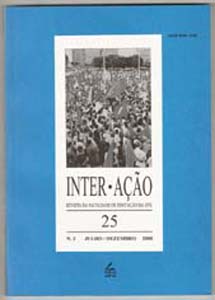O MÉTODO EM CIÊNCIAS SOCIAIS E O ESPECTRO DA SERVIDÃO VOLUNTÁRIA
DOI:
https://doi.org/10.5216/ia.v25i1.1688Abstract
O método em ciências sociais é uma discussão sempre presente nos textos de sociologia e filosofia. A presença do ser humano, com toda a sua complexidade, como parte do fenômeno analisado, é um ingrediente que apresenta grandes dificuldades adicionais em relação ao método em ciências naturais, que não apresenta essa característica. Discute-se aqui se a explicação dada por De La Boétie em 1577 para a servidão voluntária justificaria alguns aspectos relacionados ao comportamento do ser humano, como a ambição, e se essa hipótese não deveria ser incorporada fortemente no método em ciências sociais. O espectro da servidão voluntária explicaria, por exemplo, o porquê da frustação das previsões de Marxe Engels sobre a queda e o fracasso do capitalismo?
Downloads
Downloads
Published
How to Cite
Issue
Section
License
Inter-Ação uses the Creative Commons Attribution 4.0 License for Open Access Journals (Open Archives Initiative - OAI) as the basis for the transfer of rights. Open access means making documents available on the Internet free of charge, so that users can read, download, copy, distribute, print, search, or link to the full text of documents, process them for indexing, use them as input data for software programs, or use them for any other lawful purpose, without financial, legal, or technical barriers.
Authors publishing in this journal agree to the following conditions:
1) Authors retain copyright and grant the journal the right of first publication, with the work simultaneously licensed under the Creative Commons Attribution License, which permits redistribution of the work with attribution and first publication in this journal.
2) Authors are permitted to enter into additional, separate agreements for non-exclusive distribution of the version of the work published in this journal (e.g., for publication in an institutional repository or as a book chapter), with attribution and first publication in this journal.
3) Authors are permitted and encouraged to publish and distribute their work online (e.g. in institutional repositories or on their home page) at any time before or during the editorial process, as this may generate productive changes as well as increase the impact and citation of the published work.















